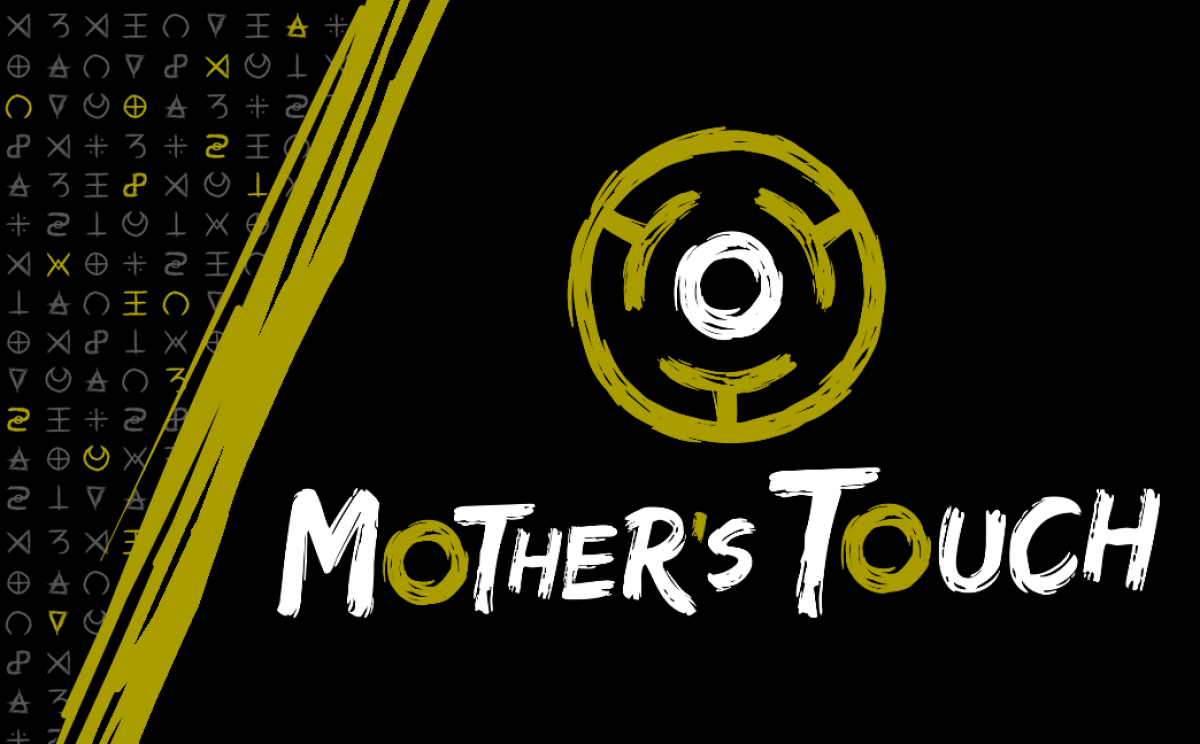It’s funny how an idea takes shape in the chaotic landscape of the mind. We mix and match words, discard thoughts, add some random luck that shows up in the shower, and voilà: we have an idea to show the world. It comes out clean, shiny, and bright; but in reality, it was actually messy to get there. Mother’s Touch. It’s a solid name, that conveys something familiar and something mysterious at the same time, and that’s just perfect for a studio name. But there’s a lot more hiding beneath the surface.
The story of Mother’s Touch actually starts a lot longer before I’ve decided to get into game development, and even longer before I’ve decided to make game development into a real job. It came from a nickname I’ve started to use as an online identity a long time ago: Mother Serpent. The name comes straight from a folk Brazilian song called Novo Aeon, from composer and songwriter Raul Seixas. It’s a song about a new era, when we would shed prejudice and moral restraints to become a people more free, united and loving, all while following the sound of the flute of the Mother Serpent. It’s a 70’s song, so, yes, a lot of drug abuse was probably involved in its writing. But the image of the serpent as a mother of a new time was a lot older than the song.

In different cultures, the serpent is a symbol of renewal, as a being capable of shedding its own skin and becoming something new. It’s not surprising that the Serpent is present in many myths regarding the birth of the world, or its ending — Quetzalcoatl for the Mesoamericans, Jormungand to the Nordics, Amduat for the Egyptians. The serpent also conveys the meaning of the resurrection and reincarnation of ancient ones in several parts of Subsaarian Africa; and even in Philosophy and general Cosmology, the Ourobouros is used to represent the Eternal Return. There’s some power in the symbol of the serpent, and it’s not hard to understand how it also became central to Abrahamic myths that are so relevant to Occidental Culture. Most famously, we have the Serpent in Paradise, persuading Eve to eat the Forbidden Fruit. The serpent, here, is the Devil, the opponent of God’s order of the world. And it’s actually this serpent the most relevant one to Raul Seixas’ song.
It should be no news to anybody that Christianity (as other Abrahamic religions) has a somewhat controversial history. In recent years the Holy Church seems to be determined to be more inclusive and lenient to the people they deem sinners, and it was about time! But just a couple of centuries ago... well, we all know about the Inquisition. Some interpretations of Satanism, then, are not about fire and pentagrams, but about opposing a worldview that segregates and chastises the differences. The Serpent, in this line of thought, brings out the need to change the rules and create a new kind of society, one based on acceptance, instead of punishment. The Serpent, the Devil, is another way of understanding morality and life in society, and, who knew, it’s also presented as a feminine figure, the Mother. And it is at this point that it’s worth to remember how women were the main target of the Church for so long, burnt into stakes for accusations of witchcraft, usually derived from the use of medicinal herbs and knowledge deemed too dangerous for the maintenance of clerical power. And, back to the creation myth, it was a woman, Eve, who first decided to challenge God and eat a fruit that gave her understanding of the world around her. The monks had their reasons to keep all the books for themselves (and those rich enough to pay).
The Mother Serpent of the song, then, it’s a certain version of a satanic perspective, in which what’s worshipped is everything that was cast out by traditional occidental morality: the freedom, the feminine, the empathy with the differences, the knowledge. Again, it was the 70’s. Lots of drugs. But it’s a beautiful idea nevertheless, a name that honors a mystical tradition of searching for wisdom and embracing the differences. This name became so important to me that it even became a superhero of its own, illustrated by a dear friend, Marcelo Paes, for an independent journalism project called Falange (I still write there, in Portuguese, from time to time, if you want to stop by).
And then came the time to baptize a studio, to give a name that could signify everything that’s important in our production, and what we really want to achieve. And that’s when chaos played its part in the process.
I love games with all my heart, love playing games, love discussing games, writing about games, and, now, building games. But there are a lot more passions that fill my life, and one of them is cooking. In fact, there’s something similar between cooking and game development. Both things are about knowing your ingredients, but also about experimenting with new combinations of tastes and flavors, and also allowing a little randomness to affect the result in a way that can create surprise. Also, both things only make sense when you do them for other people. Yes, you can cook for yourself, and can make a game only for you; but all the work you put into it is only worth it if you can give someone else the pleasure of the experience. And, in both activities, you learn a lot by just doing it and making mistakes throughout the way. And that’s why home-cooking and indie games have a special taste, even when they fail; they are unique, with a little spice that’s only possible when the result comes from a place of love, instead of the close-following of a recipe.
I don’t know which gentle spirit whispered the name Mother’s Touch in my ears, but as soon as it crossed my mind, I knew it was the perfect fit I needed. It has a direct connection to cooking since it’s an expression that’s used to define the special kind of flavoring we can only find in home-made cooking. It carries all the meaning of handcrafting something with care. But it also connects to the Mother Serpent, this name of mystic tradition, that pays homage to witchcraft. And, you know everything that’s so similar between cooking and building a game? We could say the same about spellcasting. We have to find the right magic words, mix the cauldron with care, and let the invisible forces of the universe carry our best wishes.
Handcrafted, made with love, born out of the care for other people, respecting knowledge, open to the chaos, embracing the differences, striving for magic. That’s all Mother’s Touch Games is about.



Join Our Coven